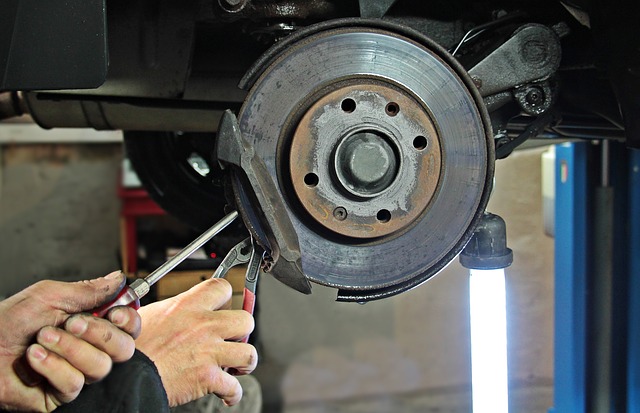Brake Health 101: Signs Your Vehicle Needs Brake Replacement

Your car’s brakes are like the unsung heroes of your daily commute, ensuring a safe and smooth journey every time you hit the road. However, like any hero, they too have their limits. Brake health is a crucial aspect of vehicle maintenance that often gets overlooked until it’s too late. In this guide, we’ll explore the subtle signs that indicate your vehicle might be in need of a brake replacement. So, buckle up (no pun intended), and let’s delve into Brake Health 101.

Understanding Brake Basics
Before we jump into the signs, let’s have a quick refresher on how your brakes work. In a nutshell, when you press the brake pedal, hydraulic fluid is sent to the brake calipers, which then squeeze the brake pads against the brake discs, creating friction and slowing down your vehicle. Over time, this process can wear down the components, leading to the need for replacement. You can get specialist brake replacement, like Toyota brake replacement, for your specific vehicle.
Signs Your Brakes Need Attention
- Squeaking or Squealing Noises
Imagine your brakes as your car’s way of saying, “Hey, I need some TLC!” One of the most audible signs that your brake pads are worn out is a high-pitched squeaking or squealing noise when you apply the brakes. This sound is often caused by a small metal shim, called an indicator, rubbing against the brake disc. If you hear this noise, it’s time to schedule a brake check.
- Grinding Sensation
If that squeaking noise is ignored for too long, it can escalate into a grinding sensation. This indicates that your brake pads are completely worn, and now, the metal backing of the brake pad is making direct contact with the brake disc. Ignoring this sound is like playing a risky game of brake roulette – you might lose.
- Reduced Responsiveness
Your brakes should be as responsive as your favorite search engine. If you notice that it takes more effort to bring your car to a stop or if the brake pedal feels spongy, it’s a clear sign that your brake system needs attention. This could be due to air or moisture in the brake fluid or a failing master cylinder.
- Vibrations or Wobbling
Smooth braking is the goal, so if you feel vibrations or wobbling when you apply the brakes, it could indicate uneven wear on the brake discs. This not only affects your car’s performance but also compromises your safety. Address this issue promptly to avoid more extensive damage.
- Burning Smell
If you catch a whiff of something burning after applying the brakes, it could be a sign that your brakes are overheating. Overheated brakes can lead to brake fade, reducing their effectiveness. This could be caused by aggressive driving, heavy loads, or a malfunction in the braking system. Either way, it’s a red flag that should not be ignored.
- Warning Lights on the Dashboard
Modern cars are equipped with a variety of sensors, and one of them is dedicated to monitoring the health of your braking system. If you see a dashboard warning light that looks like an exclamation mark inside a circle, it’s time to consult your vehicle’s manual and take the necessary steps to address the issue.
- Uneven Wear on Brake Pads
Take a moment to visually inspect your brake pads. If you notice uneven wear – for example, one side is significantly thinner than the other – it’s a sign that your brakes are not wearing uniformly. This could be due to a caliper issue, and it’s worth investigating before it leads to more severe problems.
Taking Action: Brake Replacement
Now that you’ve identified the signs that your vehicle needs a brake replacement, let’s discuss the steps to take to ensure your brakes are in top-notch condition.
- Consult a Professional
The first and most crucial step is to consult a professional mechanic. They have the expertise to assess the condition of your brakes accurately. Don’t try to play the role of a DIY brake expert unless you have the necessary skills and experience.
- Regular Brake Inspections
Prevention is better than cure. Schedule regular brake inspections as part of your routine vehicle maintenance. Catching brake issues early can save you money and ensure your safety on the road.
- Quality Brake Components
When it comes to brake replacement, quality matters. Invest in high-quality brake pads and discs to ensure longevity and optimal performance. Cheap components might save you money initially, but they can cost you more in the long run.
- Follow Manufacturer Recommendations
Every vehicle is unique, and manufacturers provide specific recommendations for brake maintenance. Consult your vehicle’s manual and follow the recommended service intervals. This ensures that you’re taking the best care possible of your braking system.
Conclusion
Your brakes are a critical component of your vehicle, and their health is non-negotiable when it comes to your safety on the road. By paying attention to the signs and symptoms discussed in this guide, you can stay ahead of potential brake issues and ensure your brakes are in top condition. Remember, a small investment in brake maintenance today can save you from a much larger headache down the road. So, listen to your car, be proactive, and keep those brakes in tip-top shape!




